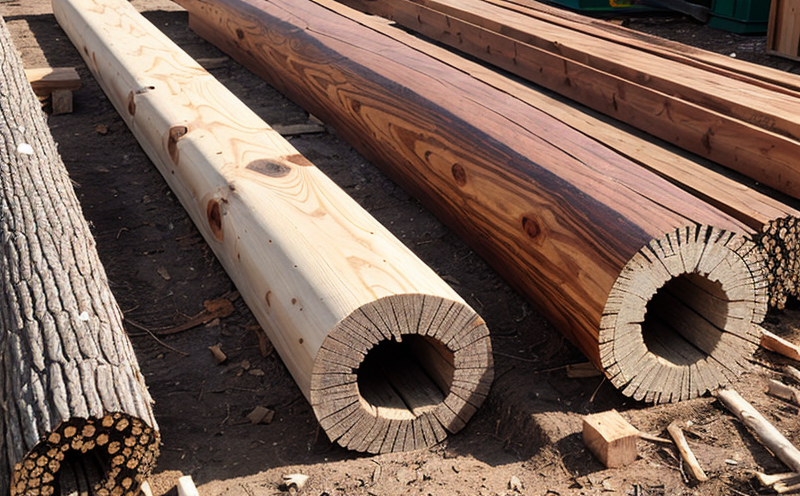Natural Durability Testing of Wood Against Termites
The natural durability testing of wood against termites is a critical aspect in ensuring the longevity and reliability of wooden structures used in agriculture, forestry, and construction. This service assesses the inherent resistance of untreated wood to termite attack, providing insights into the species' suitability for use in environments prone to insect infestation.
Termites are known as significant pests that can cause substantial damage to wooden products within a relatively short period. By evaluating natural durability, potential users of wood can make informed decisions about its application and treatment methods needed to enhance its resistance against termite attack. This testing is particularly important for applications such as fencing posts, utility poles, railway sleepers, and structural timber.
The testing process involves exposing wood samples to controlled conditions that mimic the natural environment where termites are likely to be present. The specimens undergo a period of time in which they interact with termite colonies under laboratory-controlled settings. At the end of this exposure period, the extent of damage caused by termite activity is quantified and reported.
The results of these tests provide valuable data on the natural resistance of different wood species to termites, helping manufacturers and users choose appropriate materials for their applications. For instance, tropical hardwoods like teak or ebony are known to have a higher natural durability compared to softwoods such as pine or spruce.
Understanding the natural durability of wood is crucial not only in agriculture but also in forestry and construction sectors. In agricultural settings, it ensures that wooden structures used for fencing or support systems can withstand environmental pressures and pest infestations without frequent replacements. For foresters, this knowledge aids in selecting sustainable species for reforestation projects.
In the context of construction, natural durability testing helps architects and engineers design buildings more resilient to weathering and insect damage. By incorporating naturally durable wood into structures, they can reduce maintenance costs and extend the lifespan of their projects.
It is important to note that while natural durability provides a good starting point for assessing wood's resistance against termites, additional treatments such as chemical impregnation or surface coating may be necessary depending on the specific application requirements. Our laboratory adheres strictly to international standards including ISO and ASTM guidelines when conducting these tests.
Industry Applications
- Fencing posts to ensure long-term durability in agricultural fencing
- Utility poles for reliable support of power lines and telecommunication networks
- Railway sleepers that can withstand the weight and movement of trains over extended periods
- Structural timber used in construction projects, including framing and roofing materials
The results from natural durability testing are invaluable across various industries. In agriculture, it aids in selecting appropriate fencing materials to protect crops and livestock. For forestry, it supports reforestation efforts by recommending suitable species for planting. In the construction sector, architects and engineers rely on these findings to design more resilient buildings that can endure environmental challenges.
Eurolab Advantages
- We use state-of-the-art equipment to ensure accurate and reliable results.
- Our team of experts has extensive experience in performing such tests, ensuring precision and consistency.
- We follow international standards strictly, providing you with credible reports recognized globally.
- Speedy turnaround times allow you to receive your test results promptly.
Eurolab stands out by offering a combination of cutting-edge technology, experienced personnel, and adherence to international standards. These advantages contribute to the accuracy and reliability of our natural durability testing services, ensuring that your decisions based on these tests are well-informed and sound.
Environmental and Sustainability Contributions
Natural durability testing supports sustainable practices by aiding in the selection of wood species that can withstand environmental pressures without frequent replacement. This reduces waste associated with damaged or decaying wooden structures, promoting resource efficiency within industries reliant on timber.
- By choosing naturally durable woods, there is a reduction in the need for chemical treatments which are harmful to both human health and the environment.
- The extended lifespan of wooden products due to better natural durability means fewer new trees need to be harvested, supporting reforestation efforts.
In conclusion, natural durability testing plays an essential role in fostering sustainable practices across multiple sectors including agriculture, forestry, and construction. Through accurate assessments, this service helps promote resource efficiency, reduce environmental impact, and contribute positively towards global sustainability goals.





